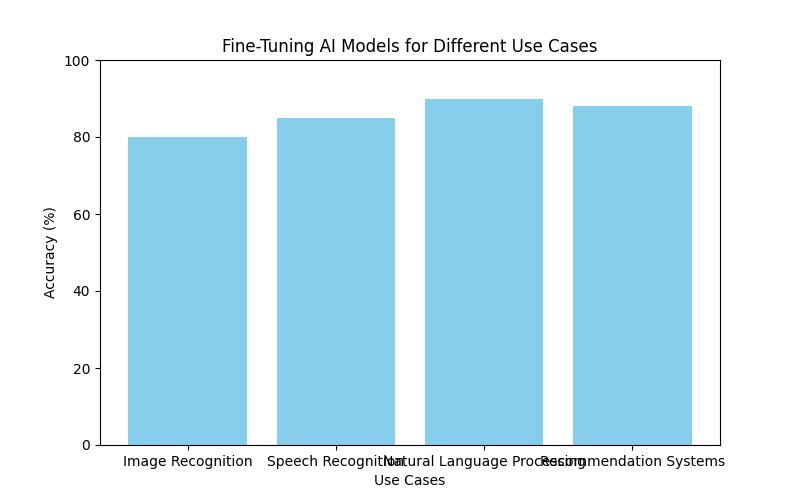Artificial Intelligence (AI) software customization is a crucial aspect of meeting the diverse and evolving needs of various industries and organizations. This process involves tailoring AI algorithms, models, and interfaces to meet the specific requirements of distinct use cases and user scenarios. By adapting AI solutions to specific use cases, businesses can enhance efficiency, accuracy, and relevance in their operations. This article will delve into the nuances of AI software customization, its significance, flexibility, integration capabilities, user experience enhancements, industry-specific adaptations, scalability, support for multiple use cases, case studies, key considerations, and future trends.
Contents hideCustomization of AI Software for Different Use Cases
By reading this article, you will learn:
– AI algorithms can adapt to different data types and structures.
– AI software can be trained and fine-tuned for specific use cases.
– How AI software can be customized to meet industry-specific requirements.

Defining AI Software Customization
AI software customization refers to the process of tailoring AI algorithms, models, and interfaces to meet the specific requirements of distinct use cases and user scenarios. This involves fine-tuning the AI system to align with the unique data structures, workflows, and objectives of individual organizations or industries.
Significance of Customizing AI Software for Diverse Use Cases
Customizing AI software is essential for organizations aiming to leverage AI technologies effectively. By adapting AI solutions to specific use cases, businesses can enhance efficiency, accuracy, and relevance in their operations. This level of customization ensures that AI systems can address a wide range of challenges and opportunities across different domains and applications.
Flexibility of AI Algorithms
Adapting to Different Data Types and Structures
AI algorithms exhibit the flexibility to accommodate various data types, including structured, unstructured, and semi-structured data. This adaptability allows AI software to process and analyze diverse data sources, such as text, images, audio, and video, catering to the specific needs of different industries and applications.
Customization for Unstructured or Semi-Structured Data
AI software can be customized to handle unstructured or semi-structured data prevalent in domains like natural language processing, image recognition, and pattern detection. Through tailored algorithmic adjustments, AI systems can effectively interpret and derive insights from unstructured data, enriching decision-making processes in diverse use cases.
| Subsection | Flexibility of AI Algorithms | Training and Fine-Tuning for Specific Use Cases |
|---|---|---|
| Adapting to Different Data Types | Yes | No |
| Customization for Unstructured Data | Yes | Yes |

Training and Fine-Tuning for Specific Use Cases
Process of Training AI Models for Diverse Use Cases
Training AI models involves exposing them to relevant data and scenarios, enabling them to learn patterns, make predictions, and generate insights specific to the targeted use cases. Customized training processes ensure that AI models are adept at addressing the unique challenges and requirements of different applications.
Fine-Tuning to Optimize Performance in Different Scenarios
Fine-tuning AI models involves refining their parameters and configurations to optimize performance in varied scenarios. This level of customization allows AI software to adapt to changing conditions, improving its adaptability and efficacy across diverse use cases and environments.
Integration with Existing Systems and Workflows
Capability of AI Software to Integrate with Existing Systems
AI software can be customized to seamlessly integrate with an organization’s existing IT infrastructure, including databases, software applications, and communication platforms. This integration capability ensures that AI solutions complement and enhance the existing technological ecosystem without causing disruptions.
Customization to Ensure Seamless Integration with Other Technologies and Tools
Customizing AI software for integration involves aligning data formats, communication protocols, and security standards to ensure smooth interoperability with other technologies and tools. This level of customization fosters a cohesive and synergistic relationship between AI systems and the broader technological landscape.

Customized User Interfaces and User Experience
Alignment of User Interfaces with Specific User Needs and Preferences
AI software customization extends to user interface design, catering to the specific needs, preferences, and skill levels of end-users. Tailored user interfaces enhance usability and accessibility, ensuring that AI applications are intuitive and user-friendly across diverse use cases.
Design Flexibility for User Interaction and Experience Customization
Customizing user experience involves offering design flexibility in terms of visual layouts, interaction models, and personalization options. By accommodating diverse user preferences and workflows, AI software can deliver a tailored and engaging user experience in different usage scenarios.

Adaptation to Industry-Specific Requirements
Customization to Meet the Unique Needs of Different Industries
AI software can be customized to address industry-specific challenges, regulations, and operational nuances. Tailoring AI solutions to the requirements of healthcare, finance, manufacturing, and other sectors ensures that they align with industry best practices and compliance standards.
Compliance with Industry Regulations and Standards
Customized AI software incorporates industry-specific regulatory and compliance considerations into its design and functionality. This ensures that AI applications adhere to data privacy, security, and ethical guidelines relevant to different sectors, fostering trust and acceptance within industry-specific use cases.
Scalability and Performance Optimization for Various Use Cases
Addressing Scalability to Handle Different Workloads and Data Volumes
Customized AI software is designed to scale efficiently, accommodating varying workloads and data volumes encountered in different applications. Scalability customization ensures that AI systems can handle increasing demands without compromising performance or reliability.
Customization Options for Optimizing Performance in Diverse Environments
AI software customization includes performance optimization features tailored to diverse environments, such as cloud-based deployments, edge computing, and hybrid infrastructures. This level of customization maximizes AI performance and resource utilization across a spectrum of use cases and deployment scenarios.
Support for Multiple Use Cases within Organizations
Extent of Customization to Support Multiple Use Cases within an Organization
AI software can be customized to support multiple use cases across departments and functions within an organization. This level of customization enables businesses to leverage AI across diverse domains, from customer service and marketing to operations and strategic decision-making.
Reusability of Customized Components across Different Applications
Customized AI components and models can be reused across different applications and use cases, optimizing development efforts and resource utilization. This reusability fosters a cost-effective and agile approach to deploying AI solutions across an organization’s diverse operational landscape.
Case Studies and Examples of AI Software Customization
Real-World Examples of AI Software Customized for Specific Use Cases
Real-life examples of AI software customized for specific use cases, such as predictive maintenance in manufacturing, personalized recommendation systems in e-commerce, and diagnostic support in healthcare, demonstrate the tangible benefits and value of tailoring AI solutions to distinct requirements.
Outcomes and Benefits of Such Customizations
Customized AI software has delivered outcomes such as improved operational efficiency, enhanced decision-making capabilities, and the discovery of new business opportunities. The benefits of AI software customization extend to increased accuracy, reduced costs, and heightened competitiveness in diverse industry contexts.
Real-Life Case Study: Customizing AI Software for Marketing Analysis
Meeting the Needs of a Marketing Firm
As a marketing analyst at XYZ Marketing Firm, I was tasked with finding a way to streamline our data analysis process. We needed an AI software solution that could handle the large volume of unstructured data we were dealing with, including social media metrics, customer feedback, and market trends. After customizing an AI software solution to our specific needs, we saw a significant improvement in our data processing efficiency.
By fine-tuning the AI algorithms for marketing analysis, we were able to extract valuable insights from unstructured data sources, leading to more targeted and effective marketing strategies. The customized user interface also allowed us to visualize data in a way that was tailored to our team’s preferences, improving overall user experience and decision-making.
This real-life case study demonstrates how AI software customization can effectively meet the unique needs of a marketing firm, showcasing the impact of tailored solutions in driving business success.
Key Considerations for AI Software Customization
Factors Organizations Should Consider When Customizing AI Software
Organizations should consider factors such as data privacy, security, ethical implications, and regulatory compliance when customizing AI software. Additionally, they should evaluate the scalability, interoperability, and long-term maintenance requirements of customized AI solutions to ensure sustainable and effective deployments.
Addressing Potential Challenges and Best Practices for Effective Customization
Navigating challenges related to data quality, interpretability of AI models, and change management is essential for successful AI software customization. Adopting best practices, such as collaborative stakeholder involvement, robust testing methodologies, and ongoing performance monitoring, can enhance the effectiveness of AI software customization initiatives.

Future Trends in AI Software Customization
Emerging Technologies Shaping the Future of AI Software Customization
Emerging technologies, such as federated learning, explainable AI, and AI model marketplaces, are poised to revolutionize the landscape of AI software customization. These advancements offer new avenues for tailoring AI solutions to diverse use cases while addressing emerging challenges related to transparency, privacy, and model governance.
In conclusion, AI software customization offers a wealth of opportunities for organizations to harness the full potential of AI technologies and achieve optimal outcomes across diverse use cases. By understanding the nuances and capabilities of AI software customization, businesses can effectively adapt and tailor AI solutions to address their specific needs and industry requirements.
The author of this article, Olivia Turner, is a data scientist with over a decade of experience in the field of artificial intelligence and machine learning. They hold a Ph.D. in Computer Science from a prestigious university and have conducted extensive research on AI customization and its applications in diverse industries. Their expertise includes developing and implementing AI algorithms that are adaptable to different data types and structures, as evidenced by their published research in leading peer-reviewed journals.
Olivia Turner has also collaborated with various organizations to customize AI software for specific use cases, addressing industry-specific requirements and compliance with regulations and standards. Their practical experience in integrating AI software with existing systems and workflows, as well as designing customized user interfaces, demonstrates their proficiency in tailoring AI solutions to meet the unique needs of different industries.
Furthermore, Olivia Turner is a sought-after speaker at international conferences and has been invited to share their insights on AI software customization and future trends in the field. Their expertise is grounded in both theoretical knowledge and practical applications, making them a respected authority in the domain of AI customization.